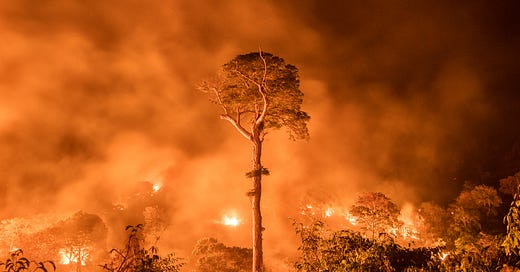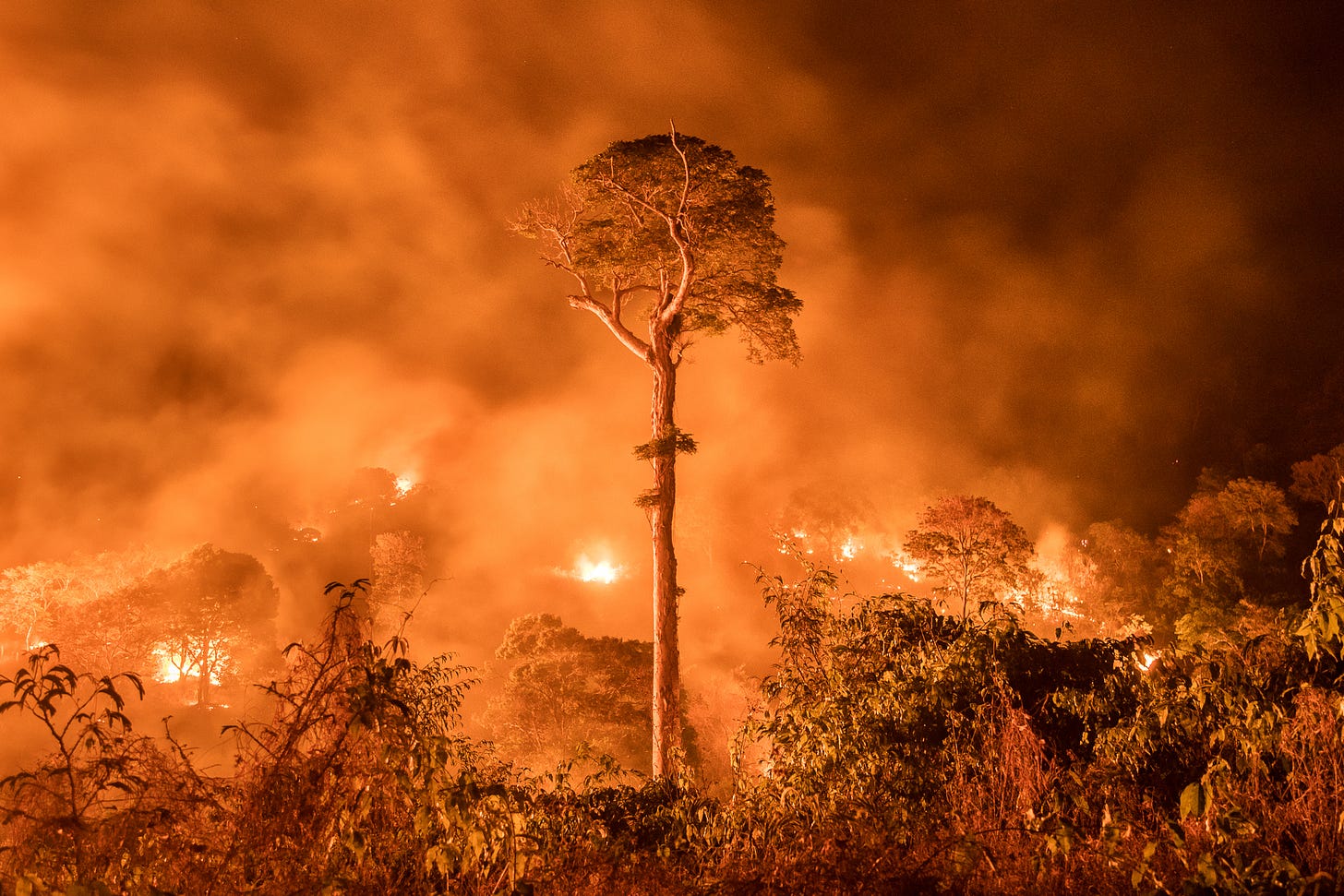I was talking to a long-time friend, and now my literary agent, yesterday about how to write this newsletter. Trevor is a great grounder – always standing there with his machete, ready to hack his way through the tangles of bullshit I present him with. He’s very good at it – he might look like the poor man’s James May but he’s a brilliant editor (his words not mine). I’d tried a couple of takes but found myself doing what most middle-aged men do – moaning about everything.
He told me recently I have a ‘colossally small attention span’. I have been trying to write a book with him for four years now. It’s brilliant of course, like all unfinished books, but I just can’t seem to write the final chapter. Not because I can’t think of an ending - it’s an autobiography - but because I can’t sit down and concentrate for more than twenty minutes. It is a problem that has afflicted me all my life. I failed at school spectacularly and left when I was just fifteen, with almost no qualifications. I couldn’t sit in class and concentrate on anything for more than a few minutes, I am the same now. It’s why I struggle in long conversations, it’s why I’m hopeless at parties that require standing around chatting. Being a National Geographic photographer means that I get endless invites to parties so I can entertain everyone with my ‘tales of adventure’.
Most Nat Geo photographers are the same. A few years ago, about ten of us were invited to a presentation by a guy who represented National Geographic Fine Art, at a rooftop bar in L.A. All the big swinging dicks were there – Ami Vitale, David Guttenfelder, Anand Varma, Aaron Huey, Cory Richards… We all sat silently. For about a minute. The guy from the agency was explaining to us how he’d grown up reading the magazine and praising its history, blowing a bunch of smoke up our asses. Then the first phone came out, then another, then the whispers started. Within five minutes he’d lost us all. He didn’t lose us because we’re rude and disrespectful (actually that’s not fair – some of us are). And he didn’t loose us because he was boring. He lost us because we all have colossally small attention spans.
‘How do I become a National Geographic Photographer’? That’s the stock question we are all asked by people we meet. There’s a stock set of answers to this stock question. And none of them add up to much because like many outlier occupations, there is no career route. The best answer I’ve found is ‘become obsessed’. The thing is though, you are either obsessed or not. It’s difficult to ‘become’ obsessed. Your personality is either obsessive or not. You have to have the catastrophic inability to concentrate on anything you are not interested in. That’s why, as a group, National Geographic photographers are bouncing off the walls in meetings. It’s why I simply can’t resist making stupid jokes at important executive level board meetings. We simply can’t help ourselves. We have to poke at things and see how they work. Poke at everything, all the time. Obsessively.
Having ‘become obsessed’ you also need to have some talent. You can learn stuff but then to get really good you need some genetic fairy dust. Photography is an incredibly easy craft to get sucked into and become obsessed with – almost to a point of addiction. Perhaps 1.5 trillion photos will be taken in 2021. Everyone now thinks they’re ‘a photographer’ and with all the apps and whatnot they probably are… to their mates. And that’s the point. Of the trillion or so photos taken in a year, very few will say something lasting. When I go out on assignment, I always think of it as gold mining – you go out with nothing but a camera and you can come back a few hours later with the most incredible nugget – something utterly beautiful, unique and valuable; something you can stare at for hours and fall in love with. Or nothing. Ever. Get it right though and the high is extraordinary. But then like any high there is a price to pay.
Obsession is normal to me, I don’t really understand another way of being, but Trevor often sees what I don’t. Obsession is what has driven humankind to become what it is – the obsession of individuals who have committed their entire being to the progression of the object of their focus – and all the world can go to hell in that pursuit. You want to become a National Geographic Photographer? Then that’s all you want to do. You don’t want to have to spend time cooking dinner. You don’t want to relax at the weekends with the partner or the kids. You don’t want to have to go visit your own parents, let alone the in-laws. You don’t want to go to parents evening. You don’t want to walk the dog, take it to the vet or even feed the fucking thing. The drive, the obsession, to get the next gem of a shot, consumes so much of your life that it falls apart. You might as well just reach deep inside, wrench your soul out and leave it at the door.
Success is often the driver of obsession. A fantasy idea you’ve cooked up in your head that you lumber around beneath, believing that there will be closure – but there isn’t. Success doesn’t make you happy; it makes you busy. I have had an exceptional career. I’ve been extraordinarily lucky. I have played my cards wild, wrong, and deeply unprofessionally, but ultimately right. I achieved every one of my stupid little goals.
But my obsession has broken me. I look back now and there’s a gaping hole; thirty years or more, all the details are there but there’s nothing else, no emotion, no feeling. I have an extraordinary memory for the details, all the elephant corpses I walked around on; all the poisoned lions and vultures; the people I met who were dying; the grinding poverty. The deeply emotional images I made, statements of a dying planet. But I felt nothing. I am told I’m a brilliant craftsman and that I can shoot emotion; which is what separates people like me from the snappers. Emotion is everything in photography. But I didn’t feel anything. I just learned how to do it - like a sociopath learns how to pretend to care.
Photography is a great way of not interacting with the world, not seeing it and not experiencing it. It’s weird, because of course it presents as the complete opposite of that. The viewfinder has taken everything from me. I’ve seen nothing. All the extraordinary things, were just details of an image or a set of numerical values in the corner of the screen, that I had to weigh up against each other – swimming with humpback whales with my fifteen-year-old son, swimming with dolphins; just photo opportunities. I have become nothing more than a parasite. Experiences and interactions have become nothing more than me getting and taking from something; me extracting what I perceive as value from something – turning interactions into tangible assets. To value and judge people, experience the world, through the potential images you could be rewarded with, is quite simply the opposite of success and it leaves you with nothing but a sense of loss.
Obsession has robbed me of some of the basic needs of a normal life (and most of us obsessives yearn for a normal life in the end). I’m trying now. I’m trying to enjoy a few simple things. I made my Mum a garden fence recently. I didn’t try and do it in a hurry, I tried to enjoy the process – the sun was out, the heady smell of wild garlic reminded me of how much I loved the spring as a kid. It’s baby steps but with a little time and a few slaps round the back of the head, I think I can make it.





Your awareness will lead you to your redemption, says my hunch.
Neuro-diversity can produce some great results for the tribe (=great photos for the magazine) but isn't always easy for the neuro-diverse. Were you ever tested for ADHD?